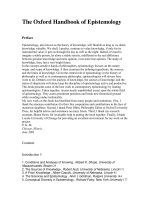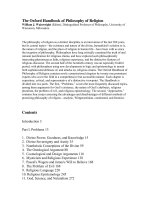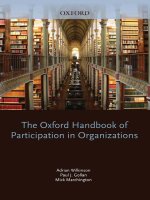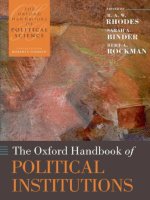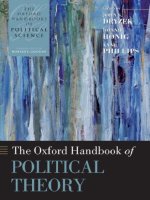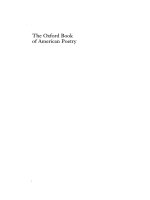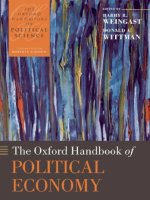- Trang chủ >>
- Khoa Học Tự Nhiên >>
- Vật lý
the oxford handbook of political theory oct 2006
Bạn đang xem bản rút gọn của tài liệu. Xem và tải ngay bản đầy đủ của tài liệu tại đây (3.39 MB, 898 trang )
the oxford handbook of
POLITICAL
THEORY
Edited by
JOHN S. DRYZEK
BONNIE HONIG
and
ANNE PHILLIPS
1
the oxford handbook of
POLITICAL THEORY
the
oxford
handbooks
of
political
science
General Editor: Robert E. Goodin
The Oxford Handbooks of Political Science is a ten volume set of reference books
offering authoritative and engaging critical overviews of all the main branches of
political science.
The series as a whole is under the General Editorship of Robert E. Goodin, with
each volume being edited by a distinguished international group of specialists in their
respective fields:
POLITICAL THEORY
John S. Dryzek, Bonnie Honig & Anne Phillips
POLITICAL INSTITUTIONS
R. A. W. Rhodes, Sarah A. Binder & Bert A. Rockman
POLITICAL BEHAVIOR
Russell J. Dalton & Hans Dieter Klingemann
COMPARATIVE POLITICS
Carles Boix & Susan C. Stokes
LAW & POLITICS
Keith E. Whittington, R. Daniel Kelemen & Gregory A. Caldeira
PUBLIC POLICY
Michael Moran, Martin Rein & Robert E. Goodin
POLITICAL ECONOMY
Barry R. Weingast & Donald A. Wittman
INTERNATIONAL RELATIONS
Christian Reus Smit & Duncan Snidal
CONTEXTUAL POLITICAL ANALYSIS
Robert E. Goodin & Charles Tilly
POLITICAL METHODOLOGY
Janet M. Box Steffensmeier, Henry E. Brady & David Collier
This series aspires to shape the discipline, not just to report on it. Like the Goodin
Klingemann New Handbook of Political Science upon which the series builds, each of
these volumes will combine critical commentaries on where the field has been
together with positive suggestions as to where it ought to be heading.
3
Great Clarendon Street, Oxford ox2 6dp
Oxford University Press is a department of the University of Oxford.
It furthers the University’s objective of excellence in research, scholarship,
and education by publishing worldwide in
Oxford New York
Auckland Cape Town Dar es Salaam Hong Kong Karachi
Kuala Lumpur Madrid Melbourne Mexico City Nairobi
New Delhi Shanghai Taipei Toronto
With offices in
Argentina Austria Brazil Chile Czech Republic France Greece
Guatemala Hungary Italy Japan Poland Portugal Singapore
South Korea Switzerland Thailand Turkey Ukraine Vietnam
Oxford is a registered trade mark of Oxford University Press
in the UK and in certain other countries
Published in the United States by Oxford University Press inc., New York
ß The several contributors 2006
Published in the United States by Oxford University Press Inc
The moral rights of the author have been asserted
Database right Oxford University Press (maker)
First published 2006
All rights reserved. No part of this publication may be reproduced,
stored in a retrieval system, or transmitted, in any form or by any means,
without the prior permission in writing of Oxford University Press,
or as expressly permitted by law, or under terms agreed with the appropriate
reprographics rights organization. Enquiries concerning reproduction
outside the scope of the above should be sent to the Rights Department,
Oxford University Press, at the address above
You must not circulate this book in any other binding or cover
and you must impose the same condition on any acquirer
British Library Cataloguing in Publication Data
Data available
Library of Congress Cataloguing in Publication Data
Data available
Typeset by SPI Publisher Services, Pondicherry, India
Printed in Great Britain
on acid-free paper by Biddles Ltd., King’s Lynn, Norfolk
ISBN 0-19-927003-1 978-0-19-927003-3
13579108642
Contents
About the Contributors xi
PART I INTRODUCTION
1. Introduction 3
John S. Dryzek,Bonnie Honig &Anne Phillips
PART II CONTEMPORARY CURRENTS
2. Justice After Rawls 45
Richard J. Arneson
3. Power After Foucault 65
Wendy Brown
4. Critical Theory Beyond Habermas 85
William E. Scheuerman
5. Feminist Theory and the Canon of Political Thought 106
Linda Zerilli
6. After the Linguistic Turn: Post-structuralist and Liberal
Pragmatist Political Theory 125
Paul Patton
7. The Pluralist Imagination 142
David Schlosberg
PART III THE LEGACY OF THE PAST
8. Theory in History: Problems of Context and Narrative 163
J. G. A. Pocock
9. The Political Theory of Classical Greece 175
Jill Frank
10. Republican Visions 193
Eric Nelson
11. Modernity and Its Critics 211
Jane Bennett
12. The History of Political Thought as Disciplinary Genre 225
James Farr
PART IV POLITICAL THEORY IN
THE WORLD
13. The Challenge of European Union 245
Richard Bellamy
14. East Asia and the West: The Impact of Confucianism on Anglo-
American Political Theory 262
Daniel A. Bell
15. In the Beginning, All the World was America: American Exceptionalism
in New Contexts 281
Ronald J. Schmidt,Jr.
16. Changing Interpretations of Modern and Contemporary Islamic
Political Theory 297
Roxanne L. Euben
vi contents
PAR T V STAT E AND PEOPL E
17. Constitutionalism and the Rule of Law 317
Shannon C. Stimson
18. Emergency Powers 333
John Ferejohn &Pasquale Pasquino
19. The People 349
Margaret Canovan
20. Civil Society and the State 363
Simone Chambers &Jeffrey Kopstein
21. Democracy and the State 382
Mark E. Warren
22. Democracy and Citizenship: Expanding Domains 400
Michael Saward
PART VI JUSTICE, EQUALITY,
AND FREEDOM
23. Impartiality 423
Susan Mendus
24. Justice, Luck, and Desert 436
Serena Olsaretti
25. Recognition and Redistribution 450
Patchen Markell
26. Equality and DiVerence 470
Judith Squires
27. Liberty, Equality, and Property 488
Andrew Williams
contents vii
28. Historical Injustice 507
Duncan Ivison
PA R T V II P LURAL ISM , MU LTIC ULTU RAL ISM ,
AND NATIONALISM
29. Nationalism 529
David Miller
30. Multiculturalism and its Critics 546
Jeff Spinner-Halev
31. Identity, DiVerence, Toleration 564
Anna Elisabetta Galeotti
32. Moral Universalism and Cultural DiVerence 581
Chandran Kukathas
PART VIII CLAIMS IN A GLOBAL CONTEXT
33. Human Rights 601
Jack Donnelly
34. From International to Global Justice? 621
Chris Brown
35. Political Secularism 636
Rajeev Bhargava
36. Multiculturalism and Post-colonial Theory 656
Paul Gilroy
PART IX THE BODY POLITIC
37. Politicizing the Body: Property, Contract, and Rights 677
Moira Gatens
viii contents
38. New Ways of Thinking about Privacy 694
Beate Roessler
39. New Technologies, Justice, and the Body 713
C
E
´
cile Fabre
40. Paranoia and Political Philosophy 729
James M. Glass
PART X TESTING THE BOUNDARIES
41. Political Theory and Cultural Studies 751
Jodi Dean
42. Political Theory and the Environment 773
John M. Meyer
43. Political Theory and Political Economy 792
Stephen L. Elkin
44. Political Theory and Social Theory 810
Christine Helliwell &Barry Hindess
PART XI OLD AND NEW
45. Then and Now: Participant-Observation in Political Theory 827
William E. Connolly
46. Exile and Re-entry: Political Theory Yesterday and Tomorrow 844
Arlene W. Saxonhouse
Index 859
contents ix
About the Contributors
Richard J. Arneson is Professor of Philosophy at the University of California, San
Diego.
Daniel A. Bell is Professor of Philosophy at Tsinghua University, Beijing.
Richard Bellamy is Professor of Political Science at University College London.
Jane Bennett is Professor of Political Science at Johns Hopkins Universit y.
Rajeev Bhargava is Senior Fellow and Director of the Programme of Social and
Political Theory, Centre for the Studies of Developing Societies, Delhi.
Chris Brown is Professor of International Relations at the London School of
Economics.
Wendy Brown is Professor of Political Science at the University of California,
Berkeley.
Margaret Canovan is Emeritus Professor of Political Thought at Keele University.
Simone Chambers is Associate Professor of Political Theory at the University of
Toronto.
William E. Connolly is Krieger-Eisenhower Professor of Political Science at Johns
Hopkins University.
Jodi Dean is Associate Professor in the Department of Political Science at Hobart
and William Smith Colleges.
Jack Donnelly is Andrew W. Mellon Professor in the Graduate School of Inter-
national Studies, University of Denver.
John S. Dryzek is Professor of Social and Political Theory, Political Science
Program, Research School of Social Sciences, Australian National University.
Stephen L. Elkin is Professor of Government and Politics at the University of
Maryland, and a Principal of the Democracy Collaborative.
Roxanne L. Euben is Associate Professor of Political Science at Wellesley College.
Ce
´
cile Fabre is Senior Lecturer in Political Theory at the London School of
Economics.
James Farr is Professor of Political Science at the University of Minnesota.
John Ferejohn is Carolyn S.G. Munro Professor of Political Science at Stanford
University.
Jill Frank is Associate Professor of Political Science at the University of South
Carolina, Columbia.
Anna Elisabetta Galeotti is Professor of Political Theory in the Department of
Humanities at the Universita
`
del Piemonte Orientale.
Moira Gatens is Professor of Philosophy at the University of Sydney.
Paul Gilroy is Anthony Giddens Professor of Social Theory at the London School
of Economics.
James M. Glass is a Professor in the Department of Government and Politics at the
University of Maryland, College Park.
Christine Helliwell is Reader in Anthropology, Faculty of Arts, Australian National
University.
Barry Hindess is Professor of Political Science, Research School of Social Sciences,
Australian National Universit y.
Bonnie Honig is Professor of Political Science at Northwestern University and
Senior Research Fellow, American Bar Foundation.
Duncan Ivison is Associate Professor of Political Science at the University of
Toronto and a member of the Department of Philosophy at the University of
Sydney.
JeVrey Kopstein is Professor of Political Science at the University of Toronto.
Chandran Kukathas is the Neal A. Maxwell Professor of Political Theory, Public
Policy and Public Service, in the Department of Political Science, University of
Utah.
Patchen Markell is Assistant Professor of Political Science at the University of
Chicago.
Susan Mendus is Professor of Political Philosophy at the University of York.
John M. Meyer is Associate Professor in the Department of Government and
Politics at Humboldt State Universit y.
David Miller is Professor of Political Theory at the University of Oxford.
xii about the contributors
Eric Nelson is Assistant Professor of Government at Harvard University, and a
junior fellow in the Harvard Society of Fellows.
Serena Olsaretti is University Senior Lecturer at the Faculty of Philosophy, and
Teaching Fellow at St. John’s College, Cambridge.
Pasquale Pasquino is Directeur de Recherche [Senior Fellow] at the CNRS-Centre
de Theorie et Analyse du Droit, Paris, and Professor in Politics at New York
University.
Paul Patton is Professor of Philosophy at the University of New South Wales.
Anne Phillips is Professor of Gender Theory and holds a joint appointment in the
Department of Government and the Gender Institute, London School of Economics.
Beate Roessler is Professor of Philosophy at the University of Amsterdam.
Michael Saward is Professor of Political Science at The Open Universit y.
Arlene W. Saxonhouse is the Caroline Robbins Collegiate Professor of Political
Science and Women’s Studies at the University of Michigan.
William E. Scheuerman is Professor of Political Science at Indiana University,
Bloomington.
David Schlosberg is Associate Professor and Chair of the Department of Political
Science at Northern Arizona University.
Ronald J. Schmidt, Jr., is Associate Professor of Political Science at the University of
Southern Maine.
JeV Spinner-Halev is the Kenan Eminent Professor of Political Ethics at the
University of North Carolina at Chapel Hill.
Judith Squires is Professor of Political Theory at the University of Bristol.
Shannon C. Stimson is Professor of Political Thought at the University of Califor-
nia, Berkeley.
Mark Warren holds the Harold and Dorrie Merilees Chair for the Study of
Democracy in the Department of Political Science, University of British Columbia.
Andrew Williams is Senior Lecturer in Philosophy, University of Reading.
Linda Zerilli is Professor of Political Science at Northwestern University.
about the contributors xiii
part i
INTRODUCTION
chapter 1
INTRODUCTION
john s. dryzek
bonnie honig
anne phillips
‘‘What’s your line of business, then?’’
‘‘I’m a scholar of the Enlightenment,’’ said Nicholas.
‘‘Oh Lord!’’ the young man said. ‘‘Another producer of useless
graduates!’’
Nicholas felt despondent.
(Lukes 1995: 199)
In The Curious Enlightenment of Professor Caritat—Steven Lukes’ Wctiona-
lized round-up of contemporary political theory—the hapless professor has
been kidnapped by the resistance movement and sent oV to search for
grounds for optimism. In Utilitaria, he is asked to give a lecture on ‘‘Breaking
Free from the Past;’’ in Communitaria, on ‘‘Why the Enlightenment Project
Had to Fail.’’ Neither topic is much to his taste, but it is only when he reaches
Libertaria (not, as one of its gloomy inhabitants tells him, a good place to be
unlucky, unemployed, or employed by the state) that he is made to recognize
the limited purchase of his academic expertise. At the end of the book, the
professor still has not found the mythical land of Egalitaria. But he has
derived one important lesson from his adventures: in the pursuit of any one
ideal, it is disastrous to lose sight of all the others.
This Handbook is not organized around categories such as utilitarianism,
communitarianism, or libertarianism, and though it also notes the continuing
elusiveness of egalitarianism, it does not promote any single ideal. The Hand-
book seeks, instead, to reXect the pluralism of contemporary political theory,
a pluralism we regard as a key feature and major strength of the Weld. In this
introduction, we clarify what we understand by political theory, identify major
themes and developments over recent decades, and take stock of the contem-
porary condition of the Weld. We end with an explanation of the categories
through which we have organized the contributions to the Handbook.
1WhatisPoliticalTheory?
Political Theory is an interdisciplinary endeavor whose center of gravity lies
at the humanities end of the happily still undisciplined discipline of political
science. Its traditions, approaches, and styles vary, but the Weld is united by a
commitment to theorize, critique, and diagnose the norms, practices, and
organization of political action in the past and present, in our own places and
elsewhere. Across what sometimes seem chasms of diVerence, political the-
orists share a concern with the demands of justice and how to fulWll them, the
presuppositions and promise of democracy, the divide between secular and
religious ways of life, and the nature and identity of public goods, among
many other topics.
Political theorists also share a commitment to the humanistic study of
politics (although with considerable disagreement over what that means),
and a skepticism towards the hegemony sometimes sought by our more self-
consciously ‘‘scientiWc’’ colleagues. In recent years, and especially in the USA,
the study of politics has become increasingly formal and quantitative. Indeed,
there are those for whom political theory, properly understood, would be
formal theory geared solely towards the explanation of political phenomena,
where explanation is modeled on the natural sciences and takes the form
of seeking patterns and oVering causal explanations for events in the
human world. Such approaches have been challenged—most recently by
4 john s. dryzek, bonnie honig & anne phillips
the Perestroika movement (Monroe 2005)—on behalf of more qualitative and
interpretive approaches. Political theory is located at one remove from this
quantitative vs. qualitative debate, sitting somewhere between the distanced
universals of normative philosophy and the empirical world of politics.
For a long time, the challenge for the identity of political theory has been
how to position itself productively in three sorts of location: in relation to the
academic disciplines of political science, history, and philosophy; between the
world of politics and the more abstract, ruminative register of theory; be-
tween canonical political theory and the newer resources (such as feminist
and critical theory, discourse analysis, Wlm and Wlm theory, popular and
political culture, mass media studies, neuroscience, environmental studies,
behavioral science, and economics) on which political theorists increasingly
draw. Political theorists engage with empirical work in politics, economics,
sociology, and law to inform their reXections, and there have been plenty of
productive associations between those who call themselves political scientists
and those who call themselves political theorists. The connection to law is
strongest when it comes to constitutional law and its normative foundations
(for example, Sunstein 1993; Tully 1995, 2002; this connection is covered in our
chapters by Stimson and by Ferejohn and Pasquino).
Most of political theory has an irreducibly normative component—regard-
less of whether the theory is systematic or diagnostic in its approach, textual
or cultural in its focus, analytic, critical, genealogical, or deconstructive in its
method, ideal or piecemeal in its procedures, socialist, liberal, or conservative
in its politics. The Weld welcomes all these approaches. It has a core canon,
often referred to as Plato to NATO, although the canon is itself unstable, with
the rediscovery of Wgures such as Sophocles, Thucydides, Baruch Spinoza,
and Mary Wollstonecraft, previously treated as marginal, and the addition of
new icons such as Hannah Arendt, John Rawls, Michel Foucault, and Ju
¨
rgen
Habermas. Moreover, the subject matter of political theory has always
extended beyond this canon and its interpretations, as theorists bring their
analytic tools to bear on novels, Wlm, and other cultural artifacts, and on
developments in other social sciences and even in natural science.
Political theory is an unapologetically mongrel sub-discipline, with no
dominant methodology or approach. When asked to describe themselves,
theorists will sometimes employ the shorthand of a key formative inXuence—
as in ‘‘I’m a Deleuzean,’’ or Rawlsian, or Habermasian, or Arendtian—although
it is probably more common to belabeled in this way by others than to claim the
description oneself. In contrast, however, to some neighboring producers
introduction 5
of knowledge, political theorists do not readily position themselves by reference
to three or four dominant schools that deWne their Weld. There is, for example,
no parallel to thedivision between realists, liberals, and constructivists, recently
joined by neoconservatives, that deWnes international relations theory. And
thereiscertainly nothing likethe old Marx–Weber–Durkheim triad that wasthe
staple of courses in sociological theory up to the 1970s.
Because of this, political theory can sometimes seem to lack a core identity.
Some practitioners seek to rectify the perceived lack, either by putting
political theory back into what is said to be its proper role as arbiter of
universal questions and explorer of timeless texts, or by returning the focus of
political theory to history. The majority, however, have a strong sense of their
vocation. Many see the internally riven and uncertain character of the Weld as
reXective of the internally riven and uncertain character of the political world
in which we live, bringing with it all the challenges and promises of that
condition. In the last two decades of the twentieth century, liberal, critical,
and post-structuralist theorists have (in their very diVerent ways) responded
to the breakdown of old assumptions about the unitary nature of nation-state
identities. They have rethought the presuppositions and meanings of identity,
often rejecting unitary conceptions and moving towards more pluralistic,
diverse, or agonistic conceptions in their place. These reXections have had an
impact on the Weld’s own self-perception and understanding. Happily for
political theory, the process has coincided with a movement within the
academy to reconceive knowledge as more fundamentally interdisciplinary.
This reconsideration of the function and role of the boundaries of the
academic disciplines may help others, as well as political theorists, to see
the Weld’s pluralism as a virtue and a strength, rather than a weakness in need
of rectiWcation.
1.1 Relationship with Political Science
Political theory’s relationship to the discipline of political science has not
always been a happy one. Since the founding of the discipline in the late
nineteenth century, there have been periodic proclamations of its newly scien-
tiWc character. The ‘‘soft’’ other for the new science has sometimes been
journalism, sometimes historical narrative, sometimes case-study methods. It
has also, very often, been political theory. Beginning in the 1950s, behavioral
6 johns.dryzek,bonniehonig&annephillips
revolutionaries tried to purge the ranks of theorists—and had some success at
this inone or two large Midwestern departments of political science in the USA.
The later impact ofrational choice theory encouraged others, like William Riker
(1982a: 753), to reject ‘‘belles letters, criticism, and philosophic speculation’’
along with ‘‘phenomenology and hermeneutics.’’ For those driven by their
scientiWc aspirations, it has always been important to distinguish the ‘‘true’’
scientiWc study of politics from more humanistic approaches—and political
theory has sometimes borne the brunt of this.
Political theorists have noted, in response, that science and objectivity are
steeped in a normativity that the self-proclaimed scientists wrongly disavow;
and theorists have not been inclined to take the description of political
‘‘science’’ at face value. They have challenged the idea that their own work in
normative theory lacks rigor, pointing to criteria within political theory that
diVerentiate more from less rigorous work. While resisting the epistemic
assumptions of empiricism, many also point out that much of what passes
for political theory is profoundly engaged with empirical politics: what, after
all, could be more ‘‘real’’, vital, and important than the symbols and categories
that organize our lives and the frameworks of our understanding? The French
have a word to describe what results when those elected as president and prime
minister are representatives of two diVerent political parties: cohabitation. The
word connotes, variously, cooperation, toleration, suVerance, antagonism,
and a sense of common enterprise. Cohabitation, in this sense, is a good
way to cast the relationship between political theory and political science.
1.2 Relationship with History
History as a point of reference has also proven contentious, with recurrent
debates about the extent to which theory is contained by its historical context
(see Pocock and Farr in this volume), and whether one can legitimately
employ political principles from one era as a basis for criticizing political
practice in another. When Quentin Skinner, famous for his commitment to
historical contextualism, suggested that early principles of republican free-
dom might oVer a telling alternative to the conceptions of liberty around
today, he took care to distance himself from any suggestion that ‘‘intellectual
historians should turn themselves into moralists’’ (Skinner 1998: 118). He still
drew criticism for abandoning the historian’s traditional caution.
introduction 7
In an essay published in 1989, Richard Ashcraft called upon political
theorists to acknowledge the fundamentally historical character of their
enterprise. While contemporary theorists recognize the ‘‘basic social/histor-
ical conditions which structure’’ their practice, ‘‘this recognition does not
serve as a conscious guideline for their teaching and writing of political
theory.’’ Ashcraft continued: ‘‘On the contrary, political theory is taught
and written about as if it were great philosophy rather than ideology’’ (Ash-
craft 1989: 700). For Ashcraft, acknowledging the ideological character of
political theory meant embracing its political character. The main objects of
his critique were Leo Strauss and his followers, whom Ashcraft saw as seeking
evidence of universally valid standards in canonical political theorists and
calling on those standards to judge their works. For Straussians, the wisdom
of the ancients and greats is outside history.
Ashcraft also criticized Sheldon Wolin, who shared Ashcraft’s displeasure
with Straussians, on the grounds of their inadequate attention to politics
(see Saxonhouse’s contribution to this volume). Although Wolin acknow-
ledged the historicity of the texts he had examined in his seminal Politics and
Vision (1960), Ashcraft claimed that Wolin resisted the ‘‘wholesale transform-
ation’’ that would result, in both his view and Ashcraft’s, from putting
that historicity at the center of his interpretative practice. Wolin is famous
for championing what, in the style of Hannah Arendt, he termed
‘‘the political:’’ politics understood, not in its instrumental capacity (Harold
Lasswell’s (1961) ‘‘ ‘Who gets what, when, and how’’’), but rather in its
orientation toward the public good coupled with a commitment to the
‘‘public happiness’’ of political participation. Contra Ashcraft, one might
see Wolin’s move to the political as a way of splitting the diVerence between
a Straussian universalism and the thick contextualism of Ashcraft’s preferred
historicist approach.
‘‘The political’’ is a conceptual category, itself outside of history, that rejects
the idea that politics is about universal truths, while also rejecting the
reduction of politics to interests. ‘‘The political’’ tends to connote, minimally,
some form of individual or collective action that disrupts ordinary states of
aVairs, normal life, or routine patterns of behavior or governance. There are
diverse conceptions of this notion. To take three as exemplary: the political
takes its meaning from its Wguration in Wolin’s work by contrast primarily
with statism, constitutionalism, and political apathy; in Arendt’s work by
contrast with private or natural spheres of human behavior; and in Ranciere’s
(1999) work by contrast with the ‘‘police.’’
8 john s. dryzek, bonnie honig & anne phillips
1.3 Relationship with Philosophy
The most un-historical inX uence on political theory in recent decades has
been John Rawls, whose work represents a close alliance with analytic phil-
osophy. On one popular account, Rawls arrived from outside as political
theory’s foreign savior and rescued political theory from the doldrums with
the publication in 1971 of A Theory of Justice (see Arneson in this volume).
Rawls’ book was an ambitious, normative, and systematic investigation of
what political, economic, and social justice should look like in contemporary
democracies. With the distancing mechanisms of a veil of ignorance and
hypothetical social contract, Rawls followed Kant in looking to reason to
adjudicate what he saw as the fundamental question of politics: the conXict
between liberty and equality. Writing from within the discipline of philoso-
phy, he returned political theory to one of its grand styles (Tocqueville’s two-
volume Democracy in America, also written by an outsider, would represent
another). Much subsequent work on questions of justice and equality has
continued in this vein, and while those who have followed Rawls have not
necessarily shared his conclusions, they have often employed similar mind
experiments to arrive at the appropriate relationship between equality and
choice. The clamshell auction imagined by Ronald Dworkin (1981), where all
the society’s resources are up for sale and the participants employ their
clamshells to bid for what best suits their own projects in life, is another
classic illustration. Starting with what seems the remotest of scenarios,
Dworkin claims to arrive at very speciWc recommendations for the contem-
porary welfare state.
As the contributions to this volume demonstrate, one strand of current
debates in political theory revolves around the relationship between the more
abstracted or hypothetical register of analytic philosophy and approaches that
stress the speciWcities of historical or contemporary contexts. Those working
in close association with the traditions of analytic philosophy—and often
preferring to call themselves political philosophers—have generated some of
the most interesting and innovative work in recent decades. But they have
also been repeatedly challenged. Communitarians and post-structuralists
claim that the unencumbered individual of Rawlsian liberalism is not neutral
but an ideological premise with signiWcant, unacknowledged political eVects
on its theoretical conclusions (Sandel 1982; Honig 1993). Feminists criticize
the analytic abstraction from bodily diVerence as a move that reinforces
heteronormative assumptions and gender inequalities (Okin 1989; Pateman
introduction 9
1988; Zerilli and Gatens in this volume). As we indicate later in the introduc-
tion, analytic liberalism has made some considerable concessions in this
regard. In Political Liberalism, for example, Rawls no longer represents his
theory of justice as addressing what is right for all societies at all times, but is
careful to present his arguments as reXecting the intuitions of contemporary
liberal and pluralistic societies.
1.4 Relationship with ‘‘Real World’’ Politics
The way political theory positions itself in relation to political science,
history, and philosophy can be read in part as reXections on the meaning of
the political. It can also be read as reXections on the nature of theory, and
what can—or cannot—be brought into existence through theoretical work.
The possibilities are bounded on one side by utopianism. Political theorists
have seemed at their most vulnerable to criticism by political scientists or
economists when their normative explorations generate conclusions that
cannot plausibly be implemented: principles of living, perhaps, that invoke
the practices of small-scale face-to-face societies; the or principles of distri-
bution that ignore the implosion of communism or the seemingly irresistible
global spread of consumerist ideas (see Dunn 2000, for one such warning).
There is an important strand in political theory that relishes the utopian label,
regarding this as evidence of the capacity to think beyond current conWnes,
the political theorist’s version of blue-sky science. Ever since Aristotle, how-
ever, this has been challenged by an insistence on working within the param-
eters of the possible, an insistence often called ‘‘sober’’ by those who favor it.
At issue here is not the status of political theory in relation to political science,
but how theory engages with developments in the political world.
Some see it as failing to do so. John Gunnell (1986) has represented political
theory as alienated from politics, while JeVrey Isaac (1995) argues that a reader
of political theory journals in the mid 1990s would have had no idea that the
Berlin Wall had fallen. Against this, one could cite a Xurry of studies employ-
ing empirical results to shed light on the real-world prospects for the kind of
deliberative democracy currently advocated by democratic theorists (see for
example the 2005 double issue of Acta Politica); or testing out theories of
justice by reference to empirical studies of social mobility (Marshall, Swift,
and Roberts 1997). Or one might take note of the rather large number of
10 john s. dryzek, bonniehonig&annephillips
